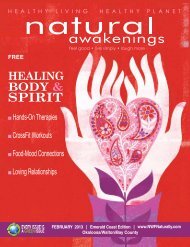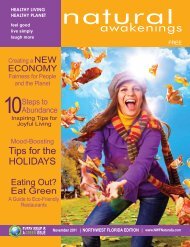Do You Have A Wheat Belly? - Natural Awakenings
Do You Have A Wheat Belly? - Natural Awakenings
Do You Have A Wheat Belly? - Natural Awakenings
Create successful ePaper yourself
Turn your PDF publications into a flip-book with our unique Google optimized e-Paper software.
Lindsborg area gather twice weekly<br />
to rehearse the three-hour piece<br />
(Bethanylb.edu/Oratorio_History.html).<br />
Becky Anderson, the owner of<br />
Lindsborg’s Swedish Country Inn, who<br />
has sung for 41 years, points to a particularly<br />
thrilling moment during each<br />
performance. “There is just this exhilaration<br />
as the audience jumps to their feet<br />
yelling, ‘Brava, Brava.’ Golly, that’s fun.”<br />
Chicagoans maintain a similar<br />
holiday tradition. For 35 years, free <strong>Do</strong>-It-<br />
<strong>You</strong>rself Messiah concerts have provided<br />
a community-funded uplift (imfChicago.<br />
org). Thousands of audience members<br />
lend their voices to thrilling performances<br />
of this masterpiece, led by a world-class<br />
conductor and soloists and backed by an<br />
all-volunteer orchestra of local professionals<br />
and amateur musicians.<br />
Storytelling is yet another community<br />
performing art that requires<br />
no special equipment. The National<br />
Storytelling Network (StoryNet.<br />
org) advances the art of storytelling<br />
through a national conference and<br />
local storytelling guilds. The Lehigh<br />
Valley Storytelling Guild, in Pennsylvania,<br />
meets once a month at a<br />
local coffee house (LVStorytellers.<br />
org). Members include professional<br />
and amateur storytellers, poets,<br />
actors and newcomers that love<br />
to practice—or just listen to—this<br />
ancient art.<br />
Strong community and cultural<br />
identity is forged on other stages, as well.<br />
The Community Actors Theatre, in San<br />
Diego, California’s, Oak Park, performs<br />
many plays written by local playwrights<br />
exploring themes in black culture (CommunityActors<br />
Theatre.com).<br />
For Calvin Manson, a local poet<br />
and playwright who teaches acting<br />
workshops, the nonprofit venue feels<br />
like a mom-and-pop outfit. “They have<br />
the raw talent that could be developed<br />
into something wonderful. People don’t<br />
just learn to be actors and playwrights.<br />
They learn to work together, to commit<br />
to a common struggle. When they leave,<br />
they know how to work with people, to<br />
be team players.”<br />
Sometimes, a life change can<br />
open the door to a creative outlet. As<br />
a newly single 30-something, photographer<br />
<strong>Do</strong>ug Plummer says that when<br />
he fell in with the Seattle contra dance<br />
scene in the mid-1980s, “It became<br />
my primary social life.” Derived from<br />
New England folk dance, two lines of<br />
dancers face each other and move to<br />
the rhythms of fiddle music.<br />
“Since 2003, anytime I’m in<br />
New England, I try to stay over on a<br />
Monday and catch the Nelson [New<br />
Hampshire] dance,” says Plummer.<br />
Likening it to participating in the<br />
slow-food and similar local movements,<br />
he says, “I feel like I’m entering<br />
into a mode of slow-dancing.”<br />
At the weekly Nelson gatherings,<br />
“The dancers will drift in; singles, couples<br />
and families with kids,” he relates. “Someone<br />
puts out the fiddle case for the $2<br />
admission. Whoever volunteered to bring<br />
baked goods sets them out. Harvey shows<br />
up with his fiddle, sits on the fold-up chair<br />
on the stage. Bob sits at the piano. ‘Line<br />
up for a contra,’ barks <strong>Do</strong>n, in a clipped,<br />
Yankee accent. ‘First dance is Monymusk.’<br />
Then everyone just joins in.”<br />
Auditioning for the Role of<br />
a Lifetime<br />
The next level of volunteer arts<br />
participation may involve an<br />
audition and a greater commitment.<br />
At the same time, these<br />
pursuits offer prime opportunities<br />
to expand artistic skills and<br />
join in something bigger than<br />
one’s self.<br />
Since 1873, the Cincinnati,<br />
Ohio, May Festival has<br />
served as a shining example<br />
“Every child is an artist. The<br />
problem is how to remain<br />
an artist once we grow up.”<br />
~ Pablo Picasso<br />
of community showmanship (May-<br />
Festival.com). Chorus auditions are<br />
held in September, rehearsals begin<br />
in January and concerts routinely sell<br />
out by May.<br />
Music critic Nancy Malitz comments,<br />
“It’s that special, tiny sliver of the<br />
year when everybody stretches. When<br />
hundreds of amateur singers accelerate the<br />
tempo by devoting every night to rehearsal<br />
and every day to thoughts of the concerts<br />
to come… when audiences look their finest,<br />
clap their loudest.”<br />
Lawrence Coleman, a chorus<br />
member for 15 years, has found that<br />
singing and networking with other May<br />
Festival vocalists has paid off in surprising<br />
ways. “I’ve recorded and had other<br />
singing engagements and opportunities,<br />
all because I’ve been connected to the<br />
chorus and the people in it,” he says.<br />
Coleman also sings with the rhythm and<br />
blues gospel group Fo Mo Brothers, performing<br />
at area churches and the Midwest<br />
Regional Black Family Reunion.<br />
Coleman remarks, “I have friends<br />
in the chorus from very different walks<br />
of life. We come together for the single<br />
purpose of making great music. People<br />
of differing backgrounds and schools of<br />
thought can do more than coexist. It’s<br />
confirmed for me that we can learn to<br />
celebrate our differences when we have<br />
a common goal.”<br />
Even those that don’t feel inherently<br />
artistic can find venturing into<br />
an art form unexpectedly rewarding.<br />
Channeling an inner Elizabeth Bennett<br />
or Mr. Darcy is commonplace<br />
in Bay Area English Regency Society<br />
waltzes and “longways” dances,<br />
in Palo Alto, California (baers.org).<br />
Alan Winston, a computer systems<br />
administrator and veteran dance<br />
caller, observes that these patterned<br />
dances appeal to math-science-logiccomputer<br />
types. “It’s a great place for<br />
people that live in their heads to get<br />
out and be social,” he says.<br />
Appropriately, the dances all feature<br />
choreography from Jane Austen’s<br />
era. Depending on the theme of the<br />
dance—like the sophisticated Cyprians<br />
Ball or spirited Return of the<br />
Regiments Ball—the ambience may<br />
be elegant or rowdy, explains Winston.<br />
Dances are taught beforehand<br />
to music such as George Washington’s<br />
Favourite Cotillion, an 1808<br />
natural awakenings September 2012<br />
15








